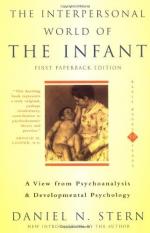
|
| Name: _________________________ | Period: ___________________ |
This test consists of 5 short answer questions, 10 short essay questions, and 1 (of 3) essay topics.
Short Answer Questions
1. By considering new experimental findings, Stern can begin to infer the _________ experience of the sense of self.
2. The interpersonal ______ created by attunement is crucial for helping an infant realize that internal feeling states can be shared with others.
3. At this stage of development, infants become emotionally responsive to the perceptions of the _________ states of others.
4. _______ psychology can also aid in searching for causes when a diagnosis is already known, according to Stern.
5. Cumulative interactive patterns, for example, may be the source of many extreme _________ disorders, though finding the cause might be impossible.
Short Essay Questions
1. What does Stern recognize about his theory, which he admits at the end of the book?
2. What does the quasi-imitation that happens between an infant and their mother produce?
3. What should psychopathology be seen as manifesting, according to the findings of Stern?
4. What do most experienced clinicians do in terms of the development theory, according to the book?
5. What does the development of the infant infer, according to Stern's findings?
6. What does Freud believe about the first few months of an infant's life, according to the book?
7. Why does language cause a split in the experience of the self, according to the book?
8. What sense is most sensitive during its formation, according to Stern in this book?
9. What happens when a child reaches their second year of living, according to the book?
10. As what does Stern hope for his work to serve within psychology and in the world, according to the content of the book?
Essay Topics
Write an essay for ONE of the following topics:
Essay Topic 1
Psychology assumes that development is the progression from one stage to the next, according to the book.
Part 1: How do you think the a human progresses in their lives?
Part 2: Why do you think the model of stages might not be effective for following the development of a human?
Part 3: Do you think that development in your own life has occurred in stages?
Essay Topic 2
Stern notes that evolution ensured survival through group membership in a species.
Part 1: Do you agree that a person needs to be a part of a group to survive?
Part 2: Do you think you could survive on your own?
Part 3: What are some of the ways that being in a group can increase your survival as a human being?
Essay Topic 3
By attuning to others, an infant is better able to learn language and other lessons, according to the findings of Stern.
Part 1: Why do you think that infants learn language better through attunement?
Part 2: Do you think humans could survive without attunement?
Part 3: How do you think attunement helps you out in your life today?
|
This section contains 655 words (approx. 3 pages at 300 words per page) |

|




